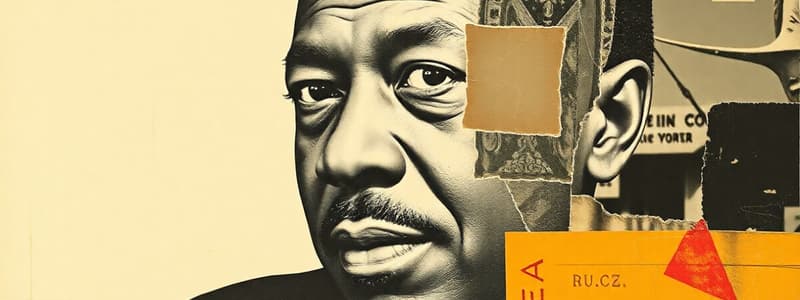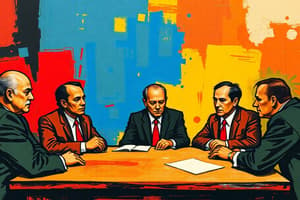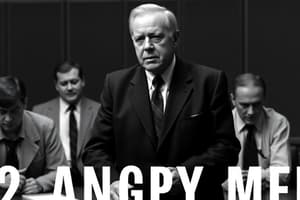Podcast
Questions and Answers
Which of the following factors significantly contributed to Reginald Lewis's success in acquiring the McCall Pattern Company?
Which of the following factors significantly contributed to Reginald Lewis's success in acquiring the McCall Pattern Company?
- His family connections within the fashion industry.
- His extensive personal savings accumulated since childhood.
- His established relationship with JP Morgan and access to financing. (correct)
- The direct intervention of President Nixon.
Reginald Lewis's initial ambition was to become the first African-American partner at Paul Weiss, a prestigious corporate law firm.
Reginald Lewis's initial ambition was to become the first African-American partner at Paul Weiss, a prestigious corporate law firm.
False (B)
What specific insight did Reginald Lewis gain from observing wealthy individuals at the Jewish private club where he worked during his summers?
What specific insight did Reginald Lewis gain from observing wealthy individuals at the Jewish private club where he worked during his summers?
how the wealthy acted and recognized value
During his early career, Lewis excelled in a particular area of law, earning an A+ on his thesis. The first line of the thesis was, 'In order to be wealthy, you must do ______'.
During his early career, Lewis excelled in a particular area of law, earning an A+ on his thesis. The first line of the thesis was, 'In order to be wealthy, you must do ______'.
Match the following individuals with their primary role or influence in Reginald Lewis's early life and career:
Match the following individuals with their primary role or influence in Reginald Lewis's early life and career:
What was the most significant outcome of Reginald Lewis's acquisition of TLC Beatrice International Foods in 1987?
What was the most significant outcome of Reginald Lewis's acquisition of TLC Beatrice International Foods in 1987?
Reginald Lewis abandoned his goal of acquiring a company after several unsuccessful attempts in the early 1970s.
Reginald Lewis abandoned his goal of acquiring a company after several unsuccessful attempts in the early 1970s.
Besides financial capital, what non-monetary resource or quality did Reginald Lewis recognize as essential for successfully executing leveraged buyouts?
Besides financial capital, what non-monetary resource or quality did Reginald Lewis recognize as essential for successfully executing leveraged buyouts?
Prior to his success in business, Reginald Lewis demonstrated entrepreneurial spirit at a young age by selling his _________ at age twelve in a leveraged buyout deal.
Prior to his success in business, Reginald Lewis demonstrated entrepreneurial spirit at a young age by selling his _________ at age twelve in a leveraged buyout deal.
What was the primary reason Harvard Law School initially contacted historically black colleges and universities during the Civil Rights Movement?
What was the primary reason Harvard Law School initially contacted historically black colleges and universities during the Civil Rights Movement?
Flashcards
TLC Beatrice Deal
TLC Beatrice Deal
Largest leveraged buyout of TLC Beatrice International Foods in 1987.
Grandmother's influence
Grandmother's influence
Provided confidence and responsibility to Reginald Lewis
Grandfather's lesson
Grandfather's lesson
Taught Lewis the value of saving money.
Leveraged buyout deal at age twelve
Leveraged buyout deal at age twelve
Signup and view all the flashcards
Code-Switching
Code-Switching
Signup and view all the flashcards
Thesis insight
Thesis insight
Signup and view all the flashcards
Mr. Lewis
Mr. Lewis
Signup and view all the flashcards
Engaging expert help
Engaging expert help
Signup and view all the flashcards
A.A. mess
A.A. mess
Signup and view all the flashcards
McCall Pattern Company Acquisition
McCall Pattern Company Acquisition
Signup and view all the flashcards
Study Notes
Early Life and Influences
- Reginald Lewis spent his summers in East Hampton.
- Lewis's book and legacy significantly impacted the interviewer's life and the lives of his descendants.
- In 1987, at the height of the recession, Lewis engineered the largest close to a billion leveraged buyout of TLC Beatrice International Foods.
- TLC Beatrice International Foods consisted of 64 companies in 31 countries.
- Lewis was accepted to Harvard Law School without applying.
- He established the first African-American law firm on Wall Street.
- The Reginald Lewis International Law Center stands in Harvard Law School
- In 1992, Lewis was one of the 400 wealthiest men in the United States, according to Forbes magazine.
- Lewis initially aimed to become the wealthiest black man in America.
- Lewis was born to Carolyn Cooper and Clinton Lewis in Baltimore, Maryland.
- Lewis's mother took him to his grandparents, Sam and Sevilla Cooper, when he was five years old due to family issues.
- Lewis overheard his mother reassuring his grandfather that they would pay their way.
- His mother worked two jobs, ensuring he was presentable when she returned home.
- The grandmother, a cleaning woman, instilled in him a sense of self-confidence and responsibility.
- The white lady instilled the confidence in him
- She ensured that the young Lewis always had something to occupy himself with whilst acting as babysitter
- The grandfather, a head waiter, taught him the value of saving money.
- His grandmother Sue taught him how to save and not spend everything
- She taught him the importance of saving via a Coca-Cola savings bottle
Education and Early Career
- At four years old, Lewis had a paper round delivering the Afro-American newspaper.
- He sold the paper route to his best friend at age twelve in a leveraged buyout deal.
- At age seven, Lewis expressed his ambition to become a lawyer.
- Lewis's mother ensured he looked presentable, influencing his later immaculate dress sense.
- Lewis attended a Catholic school before transitioning to Dunbar High School.
- He chose Dunbar for its strong programs in political science and sports.
- Lewis received a football scholarship to Virginia State University, where my wife went
- Lewis lost the scholarship after hurting his shoulder in the first year.
- He created a detailed schedule to balance work and academics, aiming to become a good lawyer.
- Lewis's mantra was "to be a good lawyer, you have to work hard."
Reginald Lewis Early Life and Education
- Reginald Lewis was accepted into Harvard Law School in 1965 without formally applying, during the height of the Civil Rights Movement.
- Harvard Law School had Frank Sanders, a professor who escaped Germany and later London, sought to involve the school in the Civil Rights Movement.
- Sanders aimed to expose African Americans to law, as few had lawyer fathers.
- Harvard Law School reached out to historically black colleges and universities, inviting their best students to a program.
- The goal was for these students to return and promote the study of law.
- Reginald campaigned and persisted until a professor included him as the fifth student, exceeding the quota of four.
- He participated in an eight-week summer program.
- Sanders advocated for Lewis's admission to Harvard Law School without requiring a formal application due to his performance, especially in moot court.
- Harvard initially hounded Lewis for tuition money, giving him a loan of $1,500, which he repaid with $3 million 20 years later
Harvard Law School Experience and Influences
- Lewis found Harvard intimidating because classmates had deep knowledge in various subjects.
- He formed a multi-racial study group to discuss cases, helping him prepare for class.
- A close Irish friend, Bill Slattery, and his wife, a nurse named Jail, would continue discussions at their home.
- Even in high school, Lewis worked at a Jewish private club during the summer, observing how the wealthy acted and recognized value
- As a busboy, he learned to discern who recognized value, which influenced his aspirations.
- 15 years old, he sought to become the wealthiest person in the world
Code-Switching and Mentorship
- Lewis code-switched, adapting his language to fit different social situations.
- He observed and learned from friends, who knew how "to act as if they were born with a silver spoon".
- Mentors, including white friends from Harvard, influenced how deal with others.
- Friendships in a diverse study group created the belief that "we are all the same" and "we want the same things".
Career and Early Legal Practice
- Graduates from Harvard Law School often joined Legal Services
- After Harvard, he joined Paul Weiss, a top corporate law firm in New York.
- There, he insisted on being addressed as "Mr. Lewis" to command the same respect as his white colleagues.
- One subject that he excelled at was mergers and acquisitions.
- Gained A+ grade in thesis for topic, and the first line was "In order to be wealthy, you must do mergers and acquisitions"
- The thought was also to not start a company as 90 percent fail, so better to buy a company."
- He had a successful and trappings of a middle class lifestyle but wanted to have a business where the "sky is the limit"
- There was always "the trial to buy a company"
Meeting Floyda and Personal Life
- Met his future wife, Floyda, on a blind date set up by her sister and a classmate, Ray Glover.
- Floyda, who was a law student from the Philippines, working as an administrative assistant at the Civil Rights Research Council found her way around to work on a tourist visa.
- Her father taught her he raised his children to treat everyone equally.
- On their first date, Lewis told Floyda, so that he would not only be known as a black man.
- "I'm international", he had told her.
Early Business Ventures
- the first company he wanted was "Park Sausages" for 3 million but lost out as the business was sold to someone else
- Continued searching for companies to acquire while practicing law, with registrations being sold before he could secure financing.
- Finally succeeded in buying a furniture company in Los Angeles around 1978 after 18 months of negotiations with a 66-year-old owner and his partner.
- Secured $8 million in financing for the furniture business acquisition.
- 18 months was spent, sending flowers etc ensuring smooth deal.
- Wanted to buy it 1973-1974.
Early Career and Vision
- Reginald Lewis married in 1969.
- He left Paul, Weiss, Rifkind, Wharton & Garrison to start his own law firm in 1969.
- From approximately 1972, Lewis operated his own law firm while seeking companies to acquire.
- He didn't succeed in buying a company until 1978.
- Lewis persevered for about six years despite unsuccessful attempts to buy companies, driven by his vision to own a company.
- His motivation included a desire to prove that he could achieve what others (specifically white individuals) could.
Preparation and Key Relationships
- Lewis understood the importance of preparation, leveraging his success as a lawyer.
- He opened a business account with JP Morgan, recognizing the need for financing to buy a business.
- During this time, he continued to practice law successfully, while focusing on his goal of acquiring a company to create wealth.
- Lewis built key relationships, such as those at JP Morgan, to facilitate raising capital.
- He actively expanded his network, hustling and giving out his card to everyone.
First Attempted Acquisition
- Lewis found a furniture company with good margins and cash flow to buy.
- The deal involved $8 million from the bank.
- He experienced a setback when the manager of the furniture company started exhibiting racist behavior at the closing table
- The seller made false accusations, leading to the deal falling apart.
- The failed deal caused Lewis to have a near nervous breakdown.
- Lewis's lawyer wrote a letter to the owner of the company for defamation.
- The bank, Chase Manhattan, withdrew from the deal.
Recovery and Introspection
- Lewis and his family went to their summer house in the Hamptons to recover after the failed deal.
- He spent time looking at homes, eventually buying one.
- The change of scenery in the Hamptons was important for Lewis's mental health.
- He reflected on his three failed deals, realizing he was doing something wrong.
- Lewis began reading prospectuses of companies being bought and sold to understand the process.
- As he was teaching his daughter how to ride a bike, he realized he was trying to do everything himself instead of engaging outside expert help.
Strategy Shift
- Lewis recognized the need for external expertise, understanding that successful buyouts involve their own lawyers, accountants, and investment advisors.
- He understood all parties should be invested in the deal because if the deal doesn't go through they don't get paid.
- He decided to build a team, rather than acting as his own lawyer, investment banker, and accountant.
- At this point, in roughly 1984, Lewis was 42 years old.
McCall Pattern Company Acquisition
- Macon Pattern Company, part of Beatrice deals, was being sold to pay down debt from a larger acquisition.
- The deal was valued at $22 million, requiring Lewis to put up $1 million.
- Lewis's relationship with JP Morgan, started in 1972, proved crucial.
- His best friend advised him to go to JP Morgan for financing.
- JP Morgan lent him $500,000 without collateral.
- The other $500,000 came from A.A. A mess, an African-American minority investment company created by President Nixon, he was a lawyer for.
- Echo, or equitable insurance, lent him the money at 13% interest.
- With $1 million in cash, he then got the rest from bursters, so he acquired McCall Pattern Company in 1984 at age 42.
Studying That Suits You
Use AI to generate personalized quizzes and flashcards to suit your learning preferences.


